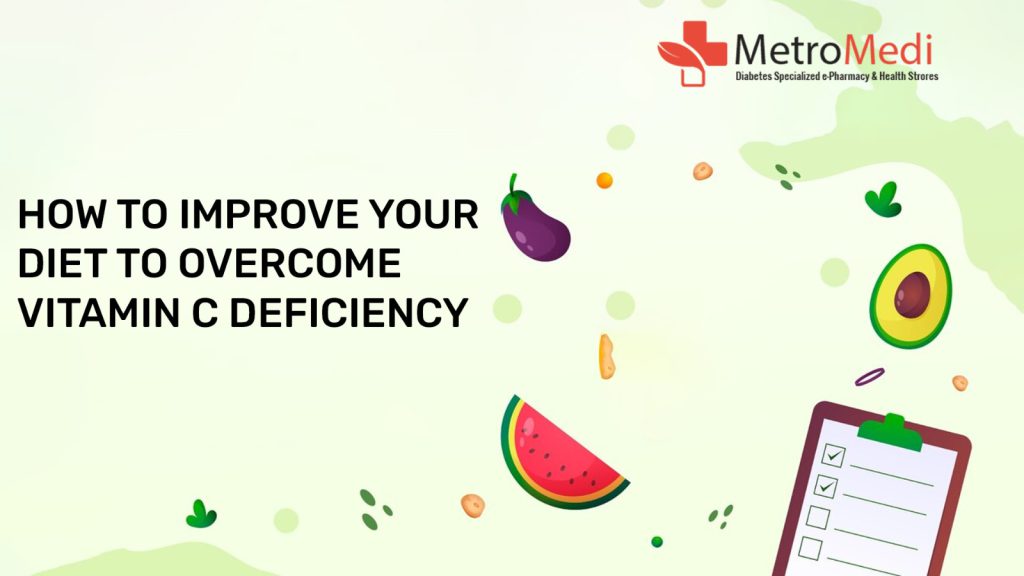
Vitamin C, also known as ascorbic acid, is a vital nutrient that plays a crucial role in maintaining overall health. It’s essential for the growth, development, and repair of all body tissues, immune function, absorption of iron, wound healing, and the maintenance of cartilage, bones, and teeth. Despite its importance, vitamin C deficiency is still common, leading to symptoms like fatigue, muscle weakness, joint and muscle aches, bleeding gums, and rashes. Fortunately, improving your diet can help overcome this deficiency. Here’s how:
1. Incorporate Vitamin C-Rich Foods
The most effective way to boost your vitamin C intake is by consuming foods rich in this essential nutrient. Here are some top choices:
- Citrus Fruits: Oranges, grapefruits, lemons, and limes are well-known for their high vitamin C content.
- Berries: Strawberries, raspberries, blueberries, and blackberries are delicious and nutritious options.
- Tropical Fruits: Mangoes, papayas, pineapples, and kiwis are excellent sources of vitamin C.
- Vegetables: Bell peppers, broccoli, Brussels sprouts, and cauliflower are all rich in vitamin C.
- Leafy Greens: Spinach, kale, and other leafy greens also contain significant amounts of vitamin C.
2. Opt for Fresh and Raw When Possible
Vitamin C is sensitive to heat, light, and air, which means cooking and prolonged storage can reduce its content in foods. To maximize your intake, aim to eat fresh, raw fruits and vegetables whenever possible. For instance, enjoy a fresh orange as a snack, add raw bell peppers to your salads, and include spinach in your smoothies.
3. Prepare Your Food Wisely
When you do need to cook your vegetables, opt for methods that preserve vitamin C content:
- Steaming: This method retains more vitamin C compared to boiling.
- Microwaving: Quick cooking times help preserve vitamin C.
- Minimal Cooking Time: The less time food is exposed to heat, the better. Try to cook vegetables just until they are tender.
4. Combine Foods for Maximum Absorption
Vitamin C enhances the absorption of non-heme iron (the type of iron found in plant-based foods). Pairing vitamin C-rich foods with iron-rich foods can help improve your overall nutrient intake. For example, add strawberries to your spinach salad or squeeze lemon juice over your iron-fortified cereal.
5. Snack Smart
Make vitamin C-rich foods your go-to snacks. Keep a bowl of fresh fruits like oranges, kiwis, and berries on your kitchen counter. Carry cut-up bell peppers or cherry tomatoes with you for a quick and nutritious snack on the go.
6. Consider Supplements if Necessary
While it’s best to get your nutrients from food, sometimes dietary restrictions, medical conditions, or lifestyle factors can make it difficult to meet your needs through diet alone. In such cases, a vitamin C supplement might be beneficial. Consult with a healthcare provider before starting any supplement regimen to ensure it’s appropriate for you.
7. Monitor Your Intake
Keeping track of your daily food intake can help you ensure you’re getting enough vitamin C. There are various apps and online tools available that can help you monitor your nutrient intake. The recommended daily allowance (RDA) for vitamin C varies by age and gender, but generally, adult men need about 90 mg per day, and adult women need about 75 mg per day.
8. Stay Informed
Educate yourself about the vitamin C content in different foods and stay updated on new dietary guidelines and recommendations. Knowledge is power, and being informed will help you make better dietary choices.
Conclusion
Improving your diet to overcome vitamin C deficiency is a matter of incorporating a variety of nutrient-rich foods, opting for fresh and raw options when possible, preparing your food wisely, and possibly considering supplements. By making these changes, you can ensure you’re getting enough vitamin C to support your overall health and well-being. Remember, a balanced diet is key to maintaining optimal health, so focus on a variety of nutrients to complement your vitamin C intake.
